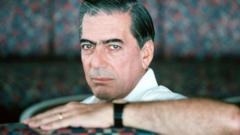Renowned for his critical exploration of Latin America's complexities, Vargas Llosa's works profoundly impacted the literary world while igniting fierce debates throughout his life.
Mario Vargas Llosa: The Controversial Titan of Latin American Literature

Mario Vargas Llosa: The Controversial Titan of Latin American Literature
Mario Vargas Llosa, the influential Peruvian author and Nobel laureate, passed away at 89, leaving behind a legacy shaped by political and social themes.
Mario Vargas Llosa, who died at the age of 89 in Lima, Peru, was an eminent literary figure whose profound impact on Latin American literature resonated globally. A key player in the Latin American Boom, his works, including over 50 published novels, essays, and plays, were characterized by their intricate narratives and bold depictions of society's prevailing issues—from authoritarianism to cultural machismo.
Born in 1936, Vargas Llosa’s early life was marked by upheaval, resulting in a diverse upbringing in both Peru and Bolivia. His literary journey began with "The Escape of the Inca," culminating in his first major novel, "The Time of the Hero," which chastised military corruption in 1962. This seminal work, reflective of his advocacy for social justice, garnered significant backlash from military figures, criticizing him for his vivid rendering of the brutalities he witnessed.
As part of the influential Latin American Boom, Vargas Llosa's groundbreaking narratives resonated widely, alongside contemporaries like Gabriel García Márquez, with whom he famously had a falling out after a confrontation in Mexico City. Their complex friendship, marred by rivalry and reconciliation, mirrored Vargas Llosa's tumultuous relationship with politics, echoing his shift from leftist to right-wing beliefs.
Over the decades, Vargas Llosa cultivated a reputation both as a master storyteller and a polarizing public intellectual. He ran for the presidency in 1990 with the right-wing Frente Democrático party, a campaign that distinguished his literary persona from an increasingly political life. His works from this era, such as "The Feast of the Goat," examined the intersection of personal and political trials—offering insights into the violence wrought by dictatorial regimes throughout Latin America.
Later life events, including his controversial takes on journalism and feminism, kept him in the public eye long after his prime, showcasing his evolving views and sometimes divisive commentary. His final years were spent traversing between Peru and Spain—culminating in a complex, much-discussed relationship with socialite Isabel Preysler.
Vargas Llosa's legacy remains intricately tied to his fearless exploration of human experience against the backdrop of Latin America's political landscape. His passing marks the end of an era for a generation of writers, leaving behind a rich tapestry of literary contributions that continue to inspire and provoke discourse today. With his death, the monumental voice of Vargas Llosa, along with the vibrancy of the Latin American Boom, will echo through future generations.






















